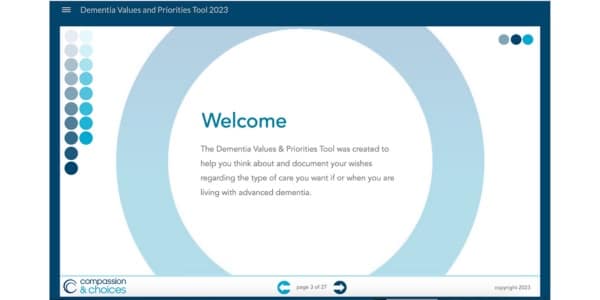Compassion & Choices is working to transform how people live and die with dementia to ensure they are empowered and supported in getting the care they want (or avoiding care they don’t want).
Dementia is rarely treated as the terminal disease it is. As a result, people with dementia are especially susceptible to aggressive, potentially burdensome and unwanted treatments that show little benefit.1 For example, there is no evidence that artificial feeding offers any benefit for a person with advanced dementia2, however there is much evidence of the risk and burden.3 And yet, it has been estimated that approximately 30% of all PEG tubes (a surgically placed feeding tube that provides nutrition directly to the stomach) are placed in people with dementia.4
Many visit the hospital in their final months, which can be especially traumatic for people with dementia. One study showed 57% of nursing home residents with advanced dementia had at least one emergency department visit in their last month of life.5 Yet when asked what they would want if they had advanced dementia, most adults said they would prefer to be kept comfortable and avoid suffering, as opposed to receiving treatments that prolong life.6
Compassion & Choices seeks to ensure people are planning for the kind of death they want if living with dementia. Our goal is to empower people to take action, consider what matters most to them and discuss those wishes.
Every adult with decision-making capacity has the option to refuse or stop unwanted treatments. However, standard advance directives do not address the complex and unique issues that arise with advanced dementia…and more importantly, how one dies when living with dementia. As such, Compassion & Choices is committed to normalizing advance care planning for people with dementia so they can get the care they want – and avoid the care they do not want.
There is no cure for dementia. However, research has shown that there are ways to reduce the risk, delay the onset or even slow the progression. Focusing on a healthy diet, staying active, managing stress and socializing can go a long way to keeping the brain healthy.
Check out US Against Alzheimer’s Brain Guide for more brain health tips.
Overall, an aging population, combined with the high numbers of Americans living with chronic illnesses such as diabetes, heart disease, high blood pressure (hypertension) and lung disease are contributing to higher numbers of people living with dementia. Additional factors that increase the risk of dementia include depression, smoking, excessive alcohol use, hearing loss and a lack of physical activity.11
In addition, growing research shows the risk of dementia is much higher for Black and Hispanic Americans12 as well as those who have had greater exposure to adversity and discrimination.13
To learn more about Alzheimer’s disease and other forms of dementia, visit the National Institute on Aging.
People typically live with dementia for an average of 8-10 years. Life expectancy can vary based on the type of dementia, age at diagnosis and other health conditions.
Late or end-stage dementia is often referred to as “advanced dementia.” This means the disease has progressed to irreversible loss of cognitive and physical function.
During this final phase of life, an individual will require 24-hour care due to the following changes:
Every competent adult has the right to refuse and stop unwanted medical treatment, even if that decision leads to death. Refusing or stopping treatment can include refusing surgery and medications or stopping treatments such as dialysis, blood transfusions, and chemotherapy. If an individual has lost the ability to make their own decisions, similar decisions can be made by a surrogate decision maker (also known as a proxy or Durable Power of Attorney for Health Care).

Completing a dementia advance directive is an important first step to ensuring wishes are honored.
Voluntarily stopping eating and drinking (VSED) is a legal option when an individual has the capacity to make their own healthcare decisions. VSED (also referred to as end-of-life fasting) is a self-initiated decision to refuse all food and fluid to advance a natural death. Learn more about VSED here.
The Dementia Decoder empowers people to prepare for medical appointments and create a customized list of helpful questions.
1 Arcand M. End-of-life issues in advanced dementia: Part 1: goals of care, decision-making process, and family education. Can Fam Physician. 2015 Apr;61(4):330-4. PMID: 25873700; PMCID: PMC4396757. Accessed at https://www.ncbi.nlm.nih.gov/pmc/articles/PMC4396757/#.
2 Medline Abstracts for “Care of Patients with Advanced Dementia.” Accessed at https://www.uptodate.com/contents/care-of-patients-with-advanced-dementia/abstract/23,66-68
3 Ijaopo EO, Ijaopo RO. Tube Feeding in Individuals with Advanced Dementia: A Review of Its Burdens and Perceived Benefits. J Aging Res. 2019 Dec 19;2019:7272067. doi: 10.1155/2019/7272067. PMID: 31929906; PMCID: PMC6942829. Accessed at https://www.ncbi.nlm.nih.gov/pmc/articles/PMC6942829/.
4 Li I. Feeding Tubes in Patients with Severe Dementia. Am Fam Physician. 2002;65(8):1605-1611. Accessed at https://www.aafp.org/pubs/afp/issues/2002/0415/p1605.html#afp20020415p1605-b6.
5 Hunt, L. J., Ritchie, C. S., Cataldo, J. K., Patel, K., Stephens, C. E., Smith, A. K. (2018). Pain and Emergency Department Use in the Last Month of Life Among Older Adults With Dementia. Journal of Pain and Symptom Management. Published online: September 14, 2018. DOI: https://doi.org/10.1016/j.jpainsymman.2018.09.005. Accessed at https://www.jpsmjournal.com/article/S0885-3924(18)30465-2/fulltext.
6 Compassion & Choices NORC Omnibus Survey, 2018
7 Davis MA, Chang C, Simonton S, Bynum JPW. Trends in US Medicare Decedents’ Diagnosis of Dementia From 2004 to 2017. JAMA Health Forum. 2022;3(4):e220346. doi:10.1001/jamahealthforum.2022.0346
8 2023 Alzheimer’s Disease Facts and Figures, Alzheimer’s Association. Accessed at https://www.alz.org/alzheimers-dementia/facts-figures.
9 Id.
10 Id.
11 Alzheimer’s Disease and Healthy Aging, Division of Population Health, National Center for Chronic Disease Prevention and Health Promotion, Accessed at https://www.cdc.gov/aging/publications/features/dementia-risk-reduction-june-2022/index.html.
13 Alzheimer’s Disease and Health Aging, Division of Population Health, National Center for Chronic Disease Prevention and Health Promotion, Accessed at https://www.cdc.gov/aging/publications/features/Alz-Greater-Risk.html.
Mail contributions directly to:
Compassion & Choices Gift Processing Center
PO Box 485
Etna, NH 03750